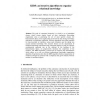Free Online Productivity Tools
i2Speak
i2Symbol
i2OCR
iTex2Img
iWeb2Print
iWeb2Shot
i2Type
iPdf2Split
iPdf2Merge
i2Bopomofo
i2Arabic
i2Style
i2Image
i2PDF
iLatex2Rtf
Sci2ools
104
click to vote
EKAW
2000
Springer
2000
Springer
KIDS: An Iterative Algorithm to Organize Relational Knowledge
The goal of conceptual clustering is to build a set of embedded classes, which cluster objects based on their similarities. Knowledge organization aims at generating the set of most specific classes: the Generalization Space. It has applications in the field of data mining, knowledge indexation or knowledge acquisition. Efficient algorithms have been proposed for data described in <attribute, value> pairs formalism and for taking into account domain knowledge. Our research focuses on the organization of relational knowledge represented using conceptual graphs. In order to avoid the combinatorial explosion due to the relations in the building of the Generalization Space, we progressively introduce the complexity of the relations. The KIDS algorithm is based upon an iterative data reformulation which allows us to use an efficient propositional knowledge organization algorithm. Experiments show that the KIDS algorithm builds an organization of relational concepts but remains with a ...
Account Domain Knowledge | EKAW 2000 | Generalization Space | Information Management | Knowledge Organization |
Related Content
| Added | 24 Aug 2010 |
| Updated | 24 Aug 2010 |
| Type | Conference |
| Year | 2000 |
| Where | EKAW |
| Authors | Isabelle Bournaud, Mélanie Courtine, Jean-Daniel Zucker |
Comments (0)

